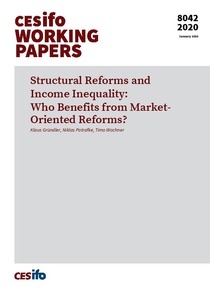Structural reforms and income inequality: who benefits from market-oriented reforms?

Gründler, Klaus ; Potrafke, Niklas ; Wochner, Timo
CESifo - Munich
2020
63 p.
income distribution ; structural change ; economic growth
CESifo working paper
8042
Income distribution
English
Bibliogr.
"We examine how structural reforms relate to income inequality. We employ many indicators of structural reforms and use data for market and net income inequality. The dataset includes up to 135 countries since 1960. The results do not suggest that market-oriented structural reforms were associated with rising income inequality in the full sample. Trade and financial liberalization were positively associated with income inequality in high-income countries. An mportant question is whether structural reforms benefit individual groups. We employ macro and micro data to investigate whether the income of low-income citizens increased to a smaller extent than the income of high-income citizens. The results suggest quite the opposite: market-oriented reforms were positively correlated with income shares of low-income citizens. We also examine citizens' support for structural reforms and show that low-income citizens are less likely to support market-oriented reforms than high-income citizens. It is conceivable that low-income citizens have misperceptions about how they benefit from market-oriented reforms."
Digital
The ETUI is co-funded by the European Union. Views and opinions expressed are however those of the author(s) only and do not necessarily reflect those of the European Union or the ETUI.